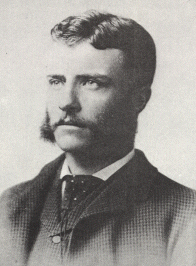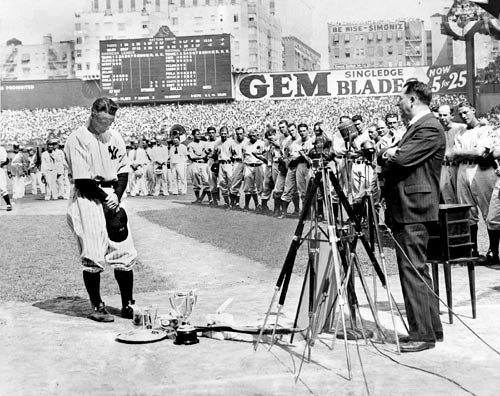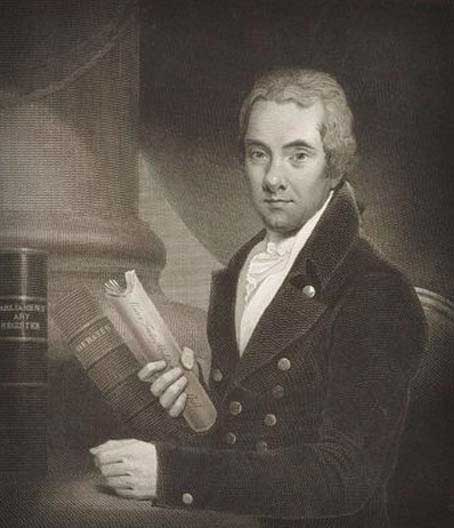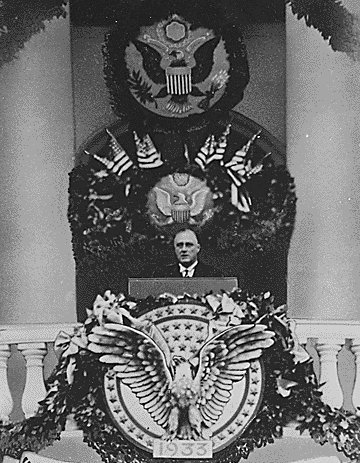
Saturday, August 09, 2008
Free Time & Loser Alert
These two posts are from the Dumb Little Man Blog and was in my email today. Perhaps it will help you sort out your life and see how to take charge and do the things that really matter.
Simplify Your Life: Delete Unwanted Commitments
Posted: 07 Aug 2008 11:27 AM CDT
 Doing what you love is the most common sense way to enjoy life more, we all know that. Removing unwanted commitments and quitting things we hate, however, isn't as obvious.
Doing what you love is the most common sense way to enjoy life more, we all know that. Removing unwanted commitments and quitting things we hate, however, isn't as obvious.There are lot of things that we would rather not do that we perceive as required and unavoidable, but in reality, are optional.
Just as we hold onto emotional baggage from past relationships, we also hold onto a lot of baggage from previous commitments and unwanted so-called "obligations" that are no longer relevant.
In reality, you don't really have to:
- Stay on the job-related committee that makes you feel important.
- Accept every "extra project" from your boss and co-workers that makes you feel more responsible.
- Be on the PTA or be the neighborhood block party organizer (unless you want to).
- Hang out with the friend you only "kind of like."
Much of this conditioning of accepting unwanted commitments comes not only from not knowing how to say no, but from living your life based on a template. If other people are doing it, that means I should too right? Well, if you just want to be another cog in the machine, be my guest.
Removing all the things from your life that you don't want, is just as powerful as adding to it the things you love doing.
Here are 4 simple ways to find out if it's something worth keeping:
- Can you remove it without becoming homeless?
If something you'd like to take off your to-do list is quitting your dead end job, you'll probably have to find a replacement first. There's obviously some things we have to do to avoid serious consequences. Like paying the electricity bill. - Does it make sense?
This is one of the most important questions, but people always leave the "me" part out. They think it makes sense from a societal point of view, from the point of view of their friends, family or some institution. But if it doesn't make sense to you, quit. Have the courage to trust your own common sense. - How important is it... really.
A lot of people justify doing things that make them unhappy because they label it as important. The fact is, keeping all your underwear and socks color coded isn't very important if you almost have a seizure when the blue is mixed in with the pink. Seriously. - Does it make you feel alive?
Our negative responses are there for a reasons: to tell us somethings wrong. But how often do we stifle that little voice that says "why the hell do you keep doing this?" In order to create a beautiful life, we have to be honest with ourselves. Ask yourself "is this something that I really want to do?" and actually listen to the answer.
There are a lot of other ways we can use shedding to improve our lives. De-cluttering and organizing our workspace. Removing all old, unused and irrelevant things from our space. Shedding emotional baggage and mental clutter can be extremely liberating.
Have you ever noticed that when you clean your workspace or your home, but you don't change your habits, in a few days or weeks it's right back to the way it was? It's important that we remember to fill what we left behind with joyful pursuits, otherwise the clutter and garbage will start to seep back in (just give it time, trust me).
The purpose of removing all the unwanted baggage from our life is not to create a vacuum, but to make room for things that make us feel alive.
Just think about what else you could do with all that free time.
-Jonathan
10 Traits of Losers: Are you One?
Posted: 07 Aug 2008 07:39 AM CDT
 What is a loser? Well, many people define it differently. Some believe that a loser is someone who has no money, no job, no family and no friends. I happen to think that a loser is someone who does not trust, does not love, and does not respect others. Perhaps the latter leads to the former but for this article, we'll skip the semantics and use my definition as the basis.
What is a loser? Well, many people define it differently. Some believe that a loser is someone who has no money, no job, no family and no friends. I happen to think that a loser is someone who does not trust, does not love, and does not respect others. Perhaps the latter leads to the former but for this article, we'll skip the semantics and use my definition as the basis.If you have no integrity and nothing but your own interests in mind, you, according to me, are a loser. Despite the large bank accounts, luxury sedans, and 5-car garage, you also may be a loser as assets don't define us. On the flip side, perhaps you're not a rich loser, perhaps you're a broke one. Regardless, let's get to the bottom of why this is so.
Qualities of a loser
- Inhibited integrity
Integrity means that your values, what you think, say, and do are all aligned. You could argue that a serial killer has integrity because this person thinks, says, and murders consistently with his word. I would argue that this isn't really the core value, because the core value of human beings is to love and be loved, and a short circuit in this person's brain is creating a disconnect between the core moral values and the thoughts that lead to being a big loser. - Unnecessary gossip and slander
In Judaism there is a word for this, Loshon Hora, which means "prohibition of telling gossip, truthful remarks about a non-present person or party." Another word, Motzei Shem Rah means "slander and untrue remarks". If you're known as a person that gossips and slanders, you're a loser, and as such, people will not have trust in you. - Chronic pessimism
I'm not talking about slight pessimism now and then, but serious, consistent, and unrelenting pessimism that makes people shy away from you and causes you to miss out on the beauty of life. Such pessimism is both stifling and paralyzing. - Pass an injured man
No matter what activity you are engaged in, you must never fail to be concerned for another person. If you can pass a man bleeding on the ground, leave a child crying and unattended, or simply refuse to be there for someone that needs you -- you're a loser! - No ambitions
They say no man is an island, and as such, you have a direct influence on the people around you. By exhibiting the contagious quality of no ambition, you are very actively and directly taking away from, and polluting, anyone you come in contact with. You should read up on suicide. - Mean and hateful
Walking around like a ticking time-bomb, waiting for a look, word, or an impression to light your fuse and set you off is no way to live. It's not what's going to get people to show you reverence that comes from love, and trust; rather this false reverence can be a product of fear, which adds negatively to the lives of others. - Don't believe in or respect yourself
It's no secret, and no lie, that before you can respect someone else you must respect yourself. How can you be fully involved in the game of life, cheering and supporting other people along, if you can't even believe in yourself as a person. The fact is that this is a choice that stems directly from positive attitude, and anything else is your refusal and resignation from taking action on a higher level. - Quit before you sweat
Listen, I'm not talking about running at the gym, although that's one possible sign that you give up too early. I'm talking about chasing your dreams, finishing what you start, and being a stand for your own integrity and core values, especially if it means dying for these beliefs. - Closed mindedness
Our perception is divided into 3 parts. What we know (that's easy), what we know we don't know (for instance, we know that there's something in outer space, but we just haven't found it yet), and what we don't know we don't know (You cannot even acknowledge this because you don't know what it is you aren't acknowledging). If you're closed minded you forget about the third one, that which you still have not discovered, even conceptually. However, if you refuse to accept that you don't know everything -- your life will be dark forever. - Take no responsibility
Passing the buck and blaming others does nothing more then delay a solution and perpetuate a problem. If you're not a winner, you'll never take responsibility, and you won't be the one person that will change the world. Simply reversing this will make you a winner.If you tread through life being self-centered, egotistical, and not give a damn about anyone else you're a loser. Being a loser isn't about how you view yourself, or what wonderful things you can do for yourself, rather it's your unwillingness to contribute back to your fellow man.
You don't have to donate a lot of money, stand in a soup kitchen, or rack up your community service hours. You can contribute by giving back to the world the best version of you, giving your time to a friend (without expecting anything in return), or help someone find a job so they can take care of themselves.
"If you're not a nice person, don't stop to analyze it. Just start thinking, speaking, and acting in a nice manner"~Rabbi Menachem M. Schneerson
Alex
Friday, August 08, 2008
Name This Local Website-61

Besides the personal Blogs there are also some professional ones like this one. Click here to go there.
You Have to See/Read This

This picture is from Eric Fetcho. It is Gladware. Before I returned to the wacky world of media, I worked in the wacky world of plastics and Mullinix here in Fort Wayne, where I used to make, (among other things), Gladware.
Click here to read the story of what is in this Gladware container of Eric's.
40 of 50 Things

This is from www.marcandangel.com
Self-reliance is a vital key to living a healthy, productive life. To be self-reliant one must master a basic set of skills, more or less making them a jack of all trades. Contrary to what you may have learned in school, a jack of all trades is far more equipped to deal with life than a specialized master of only one.
While not totally comprehensive, here is a list of 50 things everyone should know how to do.
40. Sew a Button onto Clothing – It sure is cheaper than buying a new shirt.
Thursday, August 07, 2008
Free Search Engine Optimization for your site

The two most used internet applications are Email and Search.
Did you know that you can (and should) tell Google about your website?
Simply click here and follow the instructions.
Here's where to go for Yahoo!
And MSN (Microsoft).
Or you can pay someone to do the same thing. But Why?
39 of 50 Things

This is from www.marcandangel.com
Self-reliance is a vital key to living a healthy, productive life. To be self-reliant one must master a basic set of skills, more or less making them a jack of all trades. Contrary to what you may have learned in school, a jack of all trades is far more equipped to deal with life than a specialized master of only one.
While not totally comprehensive, here is a list of 50 things everyone should know how to do.
39. Navigate with a Map and Compass – What happens when the GPS craps out and you’re in the middle of nowhere?
Wednesday, August 06, 2008
Friends

No, not the tv show. I'm talking about real life. Yesterday I saw a friend that has been out of town and out of state for the past year. It's good to have him back in town.
My wife has maintained friendships that go back 35 years. I have reconnected with friends from my past recently, now that I've been back in my home town for ten years. And there will be more before the year is over due to some upcoming reunions.
What about you? Do you maintain friends for decades? Or months? Feel free to leave a comment.
38 of 50 Things

This is from www.marcandangel.com
Self-reliance is a vital key to living a healthy, productive life. To be self-reliant one must master a basic set of skills, more or less making them a jack of all trades. Contrary to what you may have learned in school, a jack of all trades is far more equipped to deal with life than a specialized master of only one.
While not totally comprehensive, here is a list of 50 things everyone should know how to do.
38. Make a Good First Impression – Aristotle once said, “well begun is half done.”
Tuesday, August 05, 2008
37 of 50 Things

This is from www.marcandangel.com
Self-reliance is a vital key to living a healthy, productive life. To be self-reliant one must master a basic set of skills, more or less making them a jack of all trades. Contrary to what you may have learned in school, a jack of all trades is far more equipped to deal with life than a specialized master of only one.
While not totally comprehensive, here is a list of 50 things everyone should know how to do.
37. Be a Respectful House Guest – Otherwise you will be staying in a lot of hotels over the years.
Monday, August 04, 2008
Would YOU do This?
You talkin' to Me?
The 35 Greatest Speeches in History
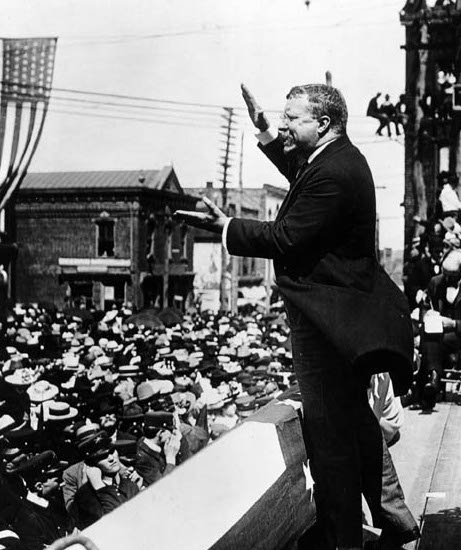 If a man wishes to become a great orator, he must first become a student of the great orators who have come before him. He must immerse himself in their texts, listening for the turns of phrases and textual symmetries, the pauses and crescendos, the metaphors and melodies that have enabled the greatest speeches to stand the test of time.
If a man wishes to become a great orator, he must first become a student of the great orators who have come before him. He must immerse himself in their texts, listening for the turns of phrases and textual symmetries, the pauses and crescendos, the metaphors and melodies that have enabled the greatest speeches to stand the test of time.
There was not currently a resource on the web to my liking that offered the man who wished to study the greatest orations of all time-from ancient to modern-not only a list of the speeches but a link to the text and a paragraph outlining the context in which the speech was given. So we decided to create one ourselves. The Art of Manliness thus proudly presents the “35 Greatest Speeches in World History,” the finest library of speeches available on the web.
These speeches lifted hearts in dark times, gave hope in despair, refined the characters of men, inspired brave feats, gave courage to the weary, honored the dead, and changed the course of history. It is my desire that this library will become a lasting resource not only to those who wish to become great orators, but to all men who wisely seek out the great mentors of history as guides on the path to virtuous manhood.
I know that readers of blogs are often more likely to skim than to read in-depth. But I challenge you, gentlemen, to attempt a program of study in which you read the entirety of one of these great speeches each and every day. I found the process of compiling and reading these speeches to be enormously inspiring and edifying, and I feel confident that you will find them equally so.
How did we compile this list?
Great oratory has three components: style, substance, and impact.
Style: A great speech must be masterfully constructed. The best orators are masters of both the written and spoken word, and use words to create texts that are beautiful to both hear and read.
Substance: A speech may be flowery and charismatically presented, and yet lack any true substance at all. Great oratory must center on a worthy theme; it must appeal to and inspire the audience’s finest values and ideals.
Impact: Great oratory always seeks to persuade the audience of some fact or idea. The very best speeches change hearts and minds and seem as revelatory several decades or centuries removed as when they were first given.
And now for the speeches.
Theodore Roosevelt, “Duties of American Citizenship”
January 26, 1883; Buffalo, New York
Given while serving as a New York assemblyman, TR’s address on the “Duties of American Citizenship” delved into both the theoretical reasons why every man should be involved in politics and the practical means of serving in that capacity. Roosevelt chided those who excused themselves from politics because they were too busy; it was every man’s duty to devote some time to maintaining good government.
Worthy Excerpt:
Of course, in one sense, the first essential for a man’s being a good citizen is his possession of the home virtues of which we think when we call a man by the emphatic adjective of manly. No man can be a good citizen who is not a good husband and a good father, who is not honest in his dealings with other men and women, faithful to his friends and fearless in the presence of his foes, who has not got a sound heart, a sound mind, and a sound body; exactly as no amount of attention to civil duties will save a nation if the domestic life is undermined, or there is lack of the rude military virtues which alone can assure a country’s position in the world. In a free republic the ideal citizen must be one willing and able to take arms for the defense of the flag, exactly as the ideal citizen must be the father of many healthy children. A race must be strong and vigorous; it must be a race of good fighters and good breeders, else its wisdom will come to naught and its virtue be ineffective; and no sweetness and delicacy, no love for and appreciation of beauty in art or literature, no capacity for building up material prosperity can possibly atone for the lack of the great virile virtues.
But this is aside from my subject, for what I wish to talk of is the attitude of the American citizen in civic life. It ought to be axiomatic in this country that every man must devote a reasonable share of his time to doing his duty in the Political life of the community. No man has a right to shirk his political duties under whatever plea of pleasure or business; and while such shirking may be pardoned in those of small cleans it is entirely unpardonable in those among whom it is most common–in the people whose circumstances give them freedom in the struggle for life. In so far as the community grows to think rightly, it will likewise grow to regard the young man of means who shirks his duty to the State in time of peace as being only one degree worse than the man who thus shirks it in time of war. A great many of our men in business, or of our young men who are bent on enjoying life (as they have a perfect right to do if only they do not sacrifice other things to enjoyment), rather plume themselves upon being good citizens if they even vote; yet voting is the very least of their duties, Nothing worth gaining is ever gained without effort. You can no more have freedom without striving and suffering for it than you can win success as a banker or a lawyer without labor and effort, without self-denial in youth and the display of a ready and alert intelligence in middle age. The people who say that they have not time to attend to politics are simply saying that they are unfit to live in a free community.
Read full text of speech here.
Winston Churchill, “We Shall Fight on the Beaches”
June 4, 1940; House of Commons, London
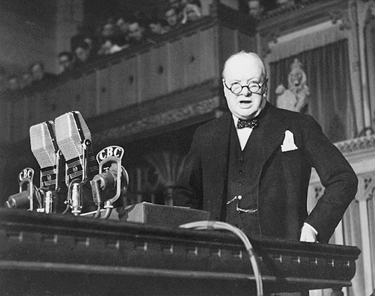
Winston Churchill, one of the greatest orators of the 20th century, was interestingly enough, like Demosthenes and other great orators before him, born with a speech impediment which he worked on until it no longer hindered him. One would never guess this from hearing Churchill’s strong and reassuring voice, a voice that would buoy up Britain during some of her darkest hours.
During the Battle of France, Allied Forces became cut off from troops south of the German penetration and perilously trapped at the Dunkirk bridgehead. On May 26, a wholesale evacuation of these troops, dubbed “Operation Dynamo,” began. The evacuation was an amazing effort-the RAF kept the Luftwaffe at bay while thousands of ships, from military destroyers to small fishing boats, were used to ferry 338,000 French and British troops to safety, far more than anyone had thought possible. On June 4, Churchill spoke before the House of Commons, giving a report which celebrated the “miraculous deliverance” at Dunkirk, while also seeking to temper a too rosy of view of what was on the whole a “colossal military disaster.”
Worthy Excerpt
I have, myself, full confidence that if all do their duty, if nothing is neglected, and if the best arrangements are made, as they are being made, we shall prove ourselves once again able to defend our Island home, to ride out the storm of war, and to outlive the menace of tyranny, if necessary for years, if necessary alone. At any rate, that is what we are going to try to do. That is the resolve of His Majesty’s Government-every man of them. That is the will of Parliament and the nation. The British Empire and the French Republic, linked together in their cause and in their need, will defend to the death their native soil, aiding each other like good comrades to the utmost of their strength. Even though large tracts of Europe and many old and famous States have fallen or may fall into the grip of the Gestapo and all the odious apparatus of Nazi rule, we shall not flag or fail. We shall go on to the end, we shall fight in France, we shall fight on the seas and oceans, we shall fight with growing confidence and growing strength in the air, we shall defend our Island, whatever the cost may be, we shall fight on the beaches, we shall fight on the landing grounds, we shall fight in the fields and in the streets, we shall fight in the hills; we shall never surrender, and even if, which I do not for a moment believe, this Island or a large part of it were subjugated and starving, then our Empire beyond the seas, armed and guarded by the British Fleet, would carry on the struggle, until, in God’s good time, the New World, with all its power and might, steps forth to the rescue and the liberation of the old.
Read full text of speech here.
Lou Gehrig, “Farewell to Baseball Address”
July 4, 1939; Yankee Stadium
It seemed as if the luminous career of Lou Gehrig would go on forever. The Yankee’s first baseman and prodigious slugger was nicknamed the Iron Horse for his durability and commitment to the game. Sadly, his record for suiting up for 2,130 consecutive games came to an end when at age 36, Gehrig was stricken with the crippling disease that now bears his name. On July 4, 1939, the Yankees held a ceremony to honor their teammate and friend. They retired Gehrig’s number, spoke of his greatness, and presented him with various gifts, plaques, and trophies. When Gehrig finally addressed the crowd, he did not use the opportunity to wallow in pity. Instead, he spoke of the things he was grateful for and what a lucky guy he was.
The Speech
Fans, for the past two weeks you have been reading about a bad break I got. Yet today I consider myself the luckiest man on the face of the earth. I have been in ballparks for seventeen years and have never received anything but kindness and encouragement from you fans.
Look at these grand men. Which of you wouldn’t consider it the highlight of his career to associate with them for even one day?
Sure, I’m lucky. Who wouldn’t consider it an honor to have known Jacob Ruppert - also the builder of baseball’s greatest empire, Ed Barrow - to have spent the next nine years with that wonderful little fellow Miller Huggins - then to have spent the next nine years with that outstanding leader, that smart student of psychology - the best manager in baseball today, Joe McCarthy!
Sure, I’m lucky. When the New York Giants, a team you would give your right arm to beat, and vice versa, sends you a gift, that’s something! When everybody down to the groundskeepers and those boys in white coats remember you with trophies, that’s something.
When you have a wonderful mother-in-law who takes sides with you in squabbles against her own daughter, that’s something. When you have a father and mother who work all their lives so that you can have an education and build your body, it’s a blessing! When you have a wife who has been a tower of strength and shown more courage than you dreamed existed, that’s the finest I know.
So I close in saying that I might have had a tough break - but I have an awful lot to live for!
Demosthenes, “The Third Philippic”
342 B.C.; Athens, Greece

Demosthenes, master statesman and orator, loved his city-state of Athens. He cherished its way of life and abundant freedoms. And he believed in standing strong against anyone who might attempt to infringe on these privileges. This passion, unfortunately, was seldom shared by his fellow Athenians. While Philip the II of Macedon made bolder and bolder incursions into the Greek peninsula, the Athenian people seemed stuck in an apathetic stupor. For years, Demosthenes employed his powerful oratorical skills in attempts to awaken his fellow citizens from sleep to the realization of the imminent danger Philip posed. When Philip advanced on Thrace, the Athenians called an assembly to debate whether or not to finally heed the great orator’s advice. Demosthenes was sick of his brethren taking liberty and the Athenian way of life for granted and he boldly called upon them to rise up and take action. After his rousing speech, the assembly all cried out, “To arms! To arms!”
Worthy Excerpt:
It is this fate, I solemnly assure you, that I dread for you, when the time comes that you make your reckoning, and realize that there is no longer anything that can be done. May you never find yourselves, men of Athens, in such a position! Yet in any case, it were better to die ten thousand deaths, than to do anything out of servility towards Philip [or to sacrifice any of those who speak for your good]. A noble recompense did the people in Oreus receive, for entrusting themselves to Philip’s friends, and thrusting Euphraeus aside! And a noble recompense the democracy of Eretria, for driving away your envoys, and surrendering to Cleitarchus! They are slaves, scourged and butchered! A noble clemency did he show to the Olynthians, who elected Lasthenes to command the cavalry, and banished Apollonides! It is folly, and it is cowardice, to cherish hopes like these, to give way to evil counsels, to refuse to do anything that you should do, to listen to the advocates of the enemy’s cause, and to fancy that you dwell in so great a city that, whatever happens, you will not suffer any harm.
Read full text of speech here.
Chief Joseph, “Surrender Speech”
October 5, 1877; Montana Territory
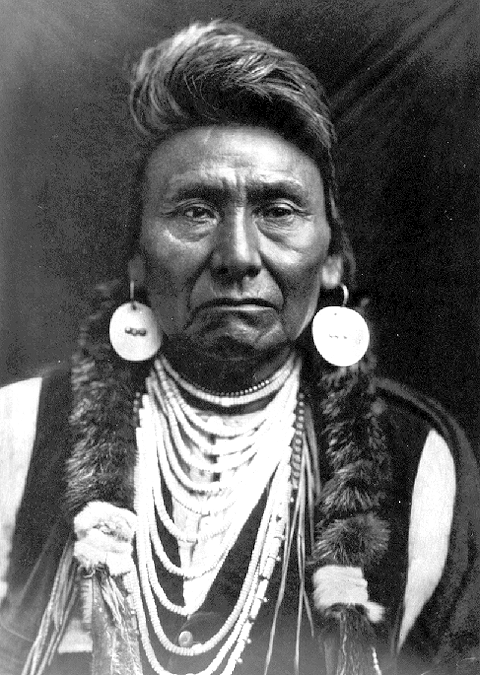
In 1877, the military announced that the Chief Joseph and his tribe of Nez Perce had to move onto a reservation in Idaho or face retribution. Desiring to avoid violence, Chief Joseph advocated peace and cooperation. But fellow tribesmen dissented and killed four white men. Knowing a swift backlash was coming, Joseph and his people began to make their way to Canada, hoping to find amnesty there. The tribe traveled 1700 miles, fighting the pursuing US army along the way. In dire conditions, and after a five day battle, Chief Joseph surrendered to General Nelson A. Miles on Oct. 5, 1877 in the Bear Paw Mountains of Montana Territory, a mere 40 miles from the Canadian border. The Chief knew he was the last of a dying breed, and the moment of surrender was heartbreaking.
The Speech
Tell General Howard I know his heart. What he told me before, I have it in my heart. I am tired of fighting. Our Chiefs are killed; Looking Glass is dead, Ta Hool Hool Shute is dead. The old men are all dead. It is the young men who say yes or no. He who led on the young men is dead. It is cold, and we have no blankets; the little children are freezing to death. My people, some of them, have run away to the hills, and have no blankets, no food. No one knows where they are - perhaps freezing to death. I want to have time to look for my children, and see how many of them I can find. Maybe I shall find them among the dead. Hear me, my Chiefs! I am tired; my heart is sick and sad. From where the sun now stands I will fight no more forever.
John F. Kennedy, “Inauguration Address”
January 20, 1961; Washington, D.C.
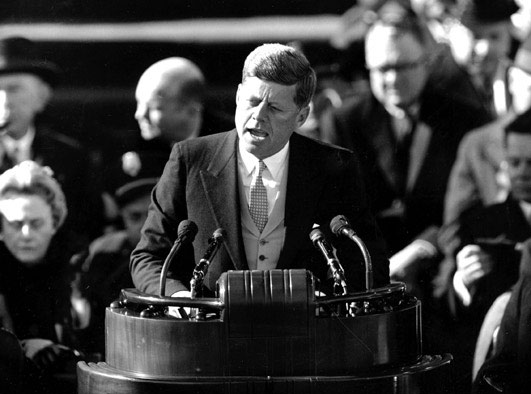
Young, handsome, with a glamorous family in tow, John F. Kennedy embodied the fresh optimism that had marked the post-war decade. On January 20, 1961, Kennedy took the oath of office as the 35th President of the United States. The youngest president in United States history, he was the first man born in the 20th century to hold that office. Listening to his inaugural address, the nation felt that a new era and a “new frontier” were being ushered in.
Worthy Excerpt:
Can we forge against these enemies a grand and global alliance, North and South, East and West, that can assure a more fruitful life for all mankind? Will you join in that historic effort?
In the long history of the world, only a few generations have been granted the role of defending freedom in its hour of maximum danger. I do not shrink from this responsibility — I welcome it. I do not believe that any of us would exchange places with any other people or any other generation. The energy, the faith, the devotion which we bring to this endeavor will light our country and all who serve it — and the glow from that fire can truly light the world.
And so, my fellow Americans: ask not what your country can do for you — ask what you can do for your country.
My fellow citizens of the world: ask not what America will do for you, but what together we can do for the freedom of man.
Read full text of speech here.
Ronald Reagan, “Address to the Nation on the Challenger”
January 28, 1986; Washington, D.C.

On January 28, 1986, millions of Americans, many of them schoolchildren watching from their classroom desks, tuned in to see 7 Americans, including Christa McAuliffe, a 37 year old schoolteacher and the first ever “civilian astronaut,” lift off in the space shuttle Challenger. Just 73 seconds later, the shuttle was consumed in a fireball. All seven aboard perished. These were the first deaths of American astronauts while in flight, and the nation was shocked and heartbroken by the tragedy. Just a few hours after the disaster, President Ronald Reagan took to the radio and airwaves, honoring these “pioneers” and offering comfort and assurance to a rattled people.
Worthy Excerpt:
We’ve grown used to wonders in this century. It’s hard to dazzle us. But for 25 years the United States space program has been doing just that. We’ve grown used to the idea of space, and perhaps we forget that we’ve only just begun. We’re still pioneers. They, the members of the Challenger crew, were pioneers.
And I want to say something to the school children of America who were watching the live coverage of the shuttle’s takeoff. I know it is hard to understand, but sometimes painful things like this happen. It’s all part of the process of exploration and discovery. It’s all part of taking a chance and expanding man’s horizons. The future doesn’t belong to the fainthearted; it belongs to the brave. The Challenger crew was pulling us into the future, and we’ll continue to follow them……
The crew of the space shuttle Challenger honoured us by the manner in which they lived their lives. We will never forget them, nor the last time we saw them, this morning, as they prepared for the journey and waved goodbye and ’slipped the surly bonds of earth’ to ‘touch the face of God.’
Read full text of speech here.
“Speech of Alexander the Great”
326 B.C.; Hydaspes River, India

In 335 B.C., Alexander the Great began his campaign to recapture former Greek cities and to expand his empire. After ten years of undefeated battles, Alexander controlled an empire that included Greece, Egypt, and what had been the massive Persian Empire.
That wasn’t enough for Xander. He decided to continue his conquest into India. But after ten years of fighting and being away from home, his men lacked the will to take part in another battle, especially against an opponent like King Porus and his army. Alexander used the talent for oration he had developed while studying under Aristotle to infuse his men with the motivation they needed to continue on, to fight and to win.
Worthy Excerpt:
I could not have blamed you for being the first to lose heart if I, your commander, had not shared in your exhausting marches and your perilous campaigns; it would have been natural enough if you had done all the work merely for others to reap the reward. But it is not so. You and I, gentlemen, have shared the labour and shared the danger, and the rewards are for us all. The conquered territory belongs to you; from your ranks the governors of it are chosen; already the greater part of its treasure passes into your hands, and when all Asia is overrun, then indeed I will go further than the mere satisfaction of our ambitions: the utmost hopes of riches or power which each one of you cherishes will be far surpassed, and whoever wishes to return home will be allowed to go, either with me or without me. I will make those who stay the envy of those who return.
William Wilberforce, “Abolition Speech”
May 12, 1789; House of Commons, London
When William Wilberforce, a member of the British Parliament, converted to Christianity, he began to earnestly seek to reform the evils he found within himself and the world around him. One of the glaring moral issues of the day was slavery, and after reading up on the subject and meeting with anti-slavery activists, Wilberforce became convinced that God was calling him to be an abolitionist. Wilberforce decided to concentrate on ending the slave trade rather than slavery itself, reasoning that the abolition of one would logically lead to the demise of the other. On May 12, 1789, Wilberforce made his first speech on the abolition of the slave trade before the House of Commons. He passionately made his case for why the trade was reprehensible and needed to cease. Wilberforce introduced a bill to abolish the trade, but it failed, a result he would become quite familiar with in the ensuing years. Yet Wilberforce never gave up, reintroducing the bill year after year, and the Slave Trade Act was finally passed in 1807.
Worthy Excerpt:
When I consider the magnitude of the subject which I am to bring before the House-a subject, in which the interests, not of this country, nor of Europe alone, but of the whole world, and of posterity, are involved: and when I think, at the same time, on the weakness of the advocate who has undertaken this great cause-when these reflections press upon my mind, it is impossible for me not to feel both terrified and concerned at my own inadequacy to such a task. But when I reflect, however, on the encouragement which I have had, through the whole course of a long and laborious examination of this question, and how much candour I have experienced, and how conviction has increased within my own mind, in proportion as I have advanced in my labours;-when I reflect, especially, that however averse any gentleman may now be, yet we shall all be of one opinion in the end;-when I turn myself to these thoughts, I take courage-I determine to forget all my other fears, and I march forward with a firmer step in the full assurance that my cause will bear me out, and that I shall be able to justify upon the clearest principles, every resolution in my hand, the avowed end of which is, the total abolition of the slave trade.
Read full text of speech here.
Theodore Roosevelt, “The Man with the Muck-rake”
April 14, 1906; Washington, D.C.
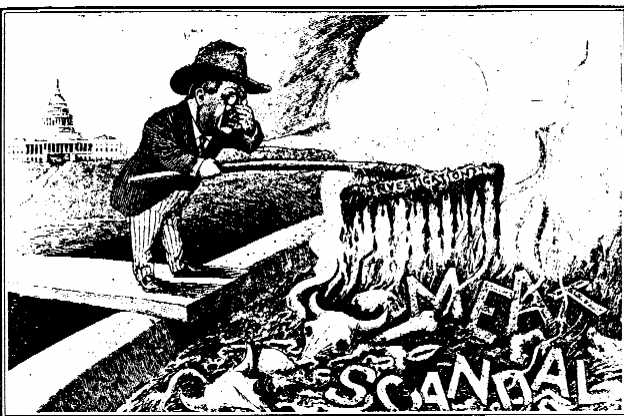
Theodore Roosevelt was president during the Progressive Era, a time of great enthusiasm for reform in government, the economy, and society. TR himself held many progressive ideals, but he also called for moderation, not extremism. The “Man with a Muck-rake” in Pilgrim’s Progress never looked heavenward but instead constantly raked the filth at his feet. TR thus dubbed the journalists and activists of the day who were intent on exposing the corruption in society as “muckrakers.” He felt that they did a tremendous amount of good, but needed to mitigate their constant pessimism and alarmist tone. He worried that the sensationalism with which these exposes were often presented would make citizens overly cynical and too prone to throw out the baby with the bathwater.
Worthy Excerpt:
To assail the great and admitted evils of our political and industrial life with such crude and sweeping generalizations as to include decent men in the general condemnation means the searing of the public conscience. There results a general attitude either of cynical belief in and indifference to public corruption or else of a distrustful inability to discriminate between the good and the bad. Either attitude is fraught with untold damage to the country as a whole. The fool who has not sense to discriminate between what is good and what is bad is well-nigh as dangerous as the man who does discriminate and yet chooses the bad. There is nothing more distressing to every good patriot, to every good American, than the hard, scoffing spirit which treats the allegation of dishonesty in a public man as a cause for laughter.
Such laughter is worse than the crackling of thorns under a pot, for it denotes not merely the vacant mind, but the heart in which high emotions have been choked before they could grow to fruition.
Read full text of speech here.
Franklin Delano Roosevelt, “First Inaugural Address”
March 4, 1933; Washington, D.C.
Franklin Delano Roosevelt handily beat incumbent Herbert Hoover in the 1932 presidential election. The country was deep into the Great Depression, and the public felt that Hoover did not fully sympathize with their plight and was not doing enough to alleviate it. No one was quite clear on what FDR’s plan was, but as in today’s election season, “change” was enough of an idea to power a campaign. In his First Inaugural Address, Roosevelt sought to buoy up the injured psyche of the American people and present his case for why he would need broad executive powers to tackle the Depression.
Worthy Excerpt:
I am certain that my fellow Americans expect that on my induction into the Presidency I will address them with a candor and a decision which the present situation of our Nation impels. This is preeminently the time to speak the truth, the whole truth, frankly and boldly. Nor need we shrink from honestly facing conditions in our country today. This great Nation will endure as it has endured, will revive and will prosper. So, first of all, let me assert my firm belief that the only thing we have to fear is fear itself-nameless, unreasoning, unjustified terror which paralyzes needed efforts to convert retreat into advance. In every dark hour of our national life a leadership of frankness and vigor has met with that understanding and support of the people themselves which is essential to victory. I am convinced that you will again give that support to leadership in these critical days.
Read the full text here.
Charles de Gaulle, “The Appeal of 18 June”
June 18, 1940; London
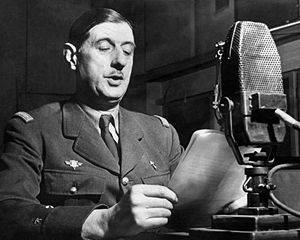
In June of 1940, it was clear that France was losing their country to the German invasion. Refusing to sign an armistice, Prime Minister Paul Reynaud was forced to resign. He was succeeded by Marshal Philippe Petain who made clear his intention to seek an accommodation with Germany. Disgusted with this decision, General Charles de Gaulle, leader of the Free French Forces, escaped to England on June 15. De Gaulle asked for, and obtained permission from Winston Churchill to make a speech on BBC radio. De Gaulle exhorted the French to not give up hope and to continue the fight against the German occupation and the Vichy Regime.
Worthy Excerpt:
But has the last word been said? Must hope disappear? Is defeat final? No!
Believe me, I who am speaking to you with full knowledge of the facts, and who tell you that nothing is lost for France. The same means that overcame us can bring us victory one day. For France is not alone! She is not alone! She is not alone! She has a vast Empire behind her. She can align with the British Empire that holds the sea and continues the fight. She can, like England, use without limit the immense industry of the United States.
This war is not limited to the unfortunate territory of our country. This war is not over as a result of the Battle of France. This war is a worldwide war. All the mistakes, all the delays, all the suffering, do not alter the fact that there are, in the world, all the means necessary to crush our enemies one day. Vanquished today by mechanical force, in the future we will be able to overcome by a superior mechanical force. The fate of the world depends on it.
Read full text of speech here.
Download Your Free Guide to Being a Gentleman in 2008.
36 of 50 Things

Kicking off another week of tips. This is from www.marcandangel.com
Self-reliance is a vital key to living a healthy, productive life. To be self-reliant one must master a basic set of skills, more or less making them a jack of all trades. Contrary to what you may have learned in school, a jack of all trades is far more equipped to deal with life than a specialized master of only one.
While not totally comprehensive, here is a list of 50 things everyone should know how to do.
36. Take Useful Notes – Because useless notes are useless, and not taking notes is a recipe for failure.
Sunday, August 03, 2008
Name This Local Website-56

A little later than previous days, but here it is, # 56 in my journey to uncover local blogs worth reading. Click here for the answer. And no this is not an eye chart.
Setting up your own On-Line Biz

Yesterday I posted some tips from Kim Komando on setting up an online business. Click here to read them.
I have also advised others in the basics of setting up the actual website and here are my usual guidelines.
- Try Google Aps. It is extremely affordable and you don't have to learn code or programming. I have one site that I'm working on building right now that the only cost was $10.00 per year and that is for the domain name through GoDaddy. I was able to buy it by going through the Google Aps site.
- Make sure everything is current. I had a client with old phone numbers and addresses and it hurt his business more than helped it.
- Make sure it works in different browsers. 70% to 85% of the world still uses Microsoft's Internet Explorer. Apple owners have Safari as their default browser. You can download a free version for a PC. Then there's the browser I switched to a few years ago, Firefox. When I took over the VP of Communications role for the Advertising Federation of Fort Wayne this summer, I also took over the role of updating the website. I check the site in all three browsers.
- Make sure it works period. Have someone else test your site and all the links on their computer.
- If you need professional help and a professional designer, let me know. I know several local pros that I can recommend.
Coffee Talk for Beginners
Cheat Codes to Have A Happy Marriage

So, I'm in my 40's, been married over 20 years, (well, to two different women), and have learned a lot and still have a lot to learn.
One thing you have to do is learn the language that your partner speaks. My wife and I both speak English, but it goes deeper than that. When she says, "The trash in the kitchen needs taking out", I can agree and do nothing, and then be accused of not listening, being an uncaring husband, etc.
I have learned that when she says that, it means she wants me to take action. There are also differences in generations in the way we use language. My son is a bit of a gamer. So when I've heard him over the years talk about "Cheat Codes", I know that it isn't automatically something illegal, or immoral.
I stumbled across this recently:
I often remember times when I played video games and had cheat codes which made winning the game faster and easier. I have wished innumerable times to have cheat codes for winning a marriage, to have cheat codes for a happy marriage.
Of course I know that there are no short cuts to a happy marriage. The basics steps of “How to have a happy marriage” have to be applied. But, even then, wouldn’t it be great if there were some tips which made having a happy married life easier; Tips which are easy to implement and yet give tremendous results.
I didn’t have cheat codes for a happy marriage when I got married. But I sure found them later on while living the marriage. These obviously do not eliminate the basics - to love, to communicate, to laugh, to forgive etc. But they do increase chances of a happy married life drastically. And most importantly, they work.








